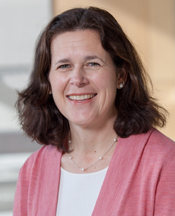Medicine from the heart . . . Mary Lindholm
March 21, 2013
Mary Lindholm, MD, assistant professor of family medicine & community health, a member of the UMass Memorial Medical Adult Primary Care practice and director of the Family Medicine Clerkship for medical students, shows how a family doctor, and only a family doctor, can care for the entire family. Some say that family physicians help patients from “birth to grave,” but Mary's story shows how we actually do more than this—we provide care from “'lust to dust.” And in some occasions the real work begins only after a patient has left this world and there are so many pieces to help sort out in his/her absence for those who are left behind.—Hugh Silk, MD
Helping Sue
 “I see you’re here for a physical, how have you been doing?” I asked this routine question a little tentatively. Often the answer with this patient is not positive. Let me step back five or so years.
“I see you’re here for a physical, how have you been doing?” I asked this routine question a little tentatively. Often the answer with this patient is not positive. Let me step back five or so years.
Susan was a beautiful, happy, 20-something who came to see me because her pediatric specialist felt she needed a primary care physician who sees adults. Sue’s specialist was a pediatric pulmonologist because she had cystic fibrosis. I’d never had a patient with CF before, at least not the full blown disease. But Sue was open and outwardly healthy, so it seemed like a relatively easy task.
CF is not an easy disease. I quickly learned that its effects on Sue’s lungs could be usurped by devastating effects on her GI system. Sue battled through it all, went to one of her favorite places, the Bahamas, multiple times with her boyfriend and family, toured Europe, and just generally tried to enjoy life. She was hospitalized a lot with flares. It was the natural rhythm of her disease, and I would visit intermittently during her hospitalizations. The last time was different. I received a call that she would be discharged with hospice care, could I come see her? I was surprised and taken off guard. She wasn’t intubated, or in the intensive care unit, just on the regular pediatric floor. How could she require hospice care? When did her disease become so terminal!
I went to see her. Her mother and stepfather, who I had never met, were in the room. Her stepfather greeted me with anger, but I chalked it up to frustration and grief. Her mother was quietly sitting by the bed, and moved so I could speak with Sue. I could tell she was struggling to breathe and I felt the tears coming as I witnessed her suffering. I couldn’t think of anything to offer to give her more comfort so I took her hand, and just told her if there was anything she could think of that I could do, just say it. We said our good-byes. She died a week or so later surrounded by family.
Several months later, a new male patient appeared on my schedule. I don’t get too many new adult male patients and was a little curious. It was Sue’s boyfriend. She had told him to come see me if he was having trouble with her death. He was, and had a lot of questions about the quickness of her demise. I tried to help him through it, gave him information and encouraged him to set up a meeting with Sue’s pulmonologist to bring some closure. He followed with me for about three years. The last time I saw him, he was in a new relationship and doing well.
A little later, Sue’s mother presented. She was much more complicated. She was racked with grief and anxiety and was in an emotionally abusive relationship with Sue’s stepfather. She spoke with pride of how Sue stood up to him. She wasn’t able to, though. Theirs was the kind of abuse you see in movies. He wanted control over her and her meager assets and when not berating her in person or to friends, he left scary notes and “gifts” for her. He had no regard for her grief over losing her daughter.
Slowly we picked up the pieces. She left her husband and got a good lawyer who had her back and was not afraid to stand up to her ex and his legal team. She started to visit other friends and care for some elderly patients, though anxiety continued to plague her.
It’s now been quite a number of years since Sue’s death. Her mother seems calm and content. Her only concern is the pain in her knees. She wants to make sure it’s under control because she’s planning a trip.
“Where are you going?” I asked.
“The Bahamas,” she answered without shedding a tear.
I don’t claim to take credit for her healing, but I feel proud of her strength and recovery and privileged to have seen her through this time of grief. It seems like Sue did figure out a way for me to help her.
Each Thursday, the Daily Voice showcases selected Thursday Morning Memos, reflective essays about clinical experiences written by faculty, alumni, residents and students of the Department of Family Medicine & Community Health and, occasionally, contributors from other departments. Thursday Morning Memos is UMass Medical School’s homegrown version of narrative medicine, in which the authors process their experiences through writing. To learn more, visit: http://www.umassmed.edu/news/articles/2011/personal_stories.aspx.